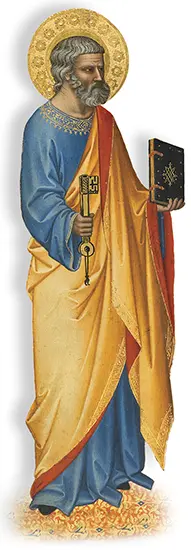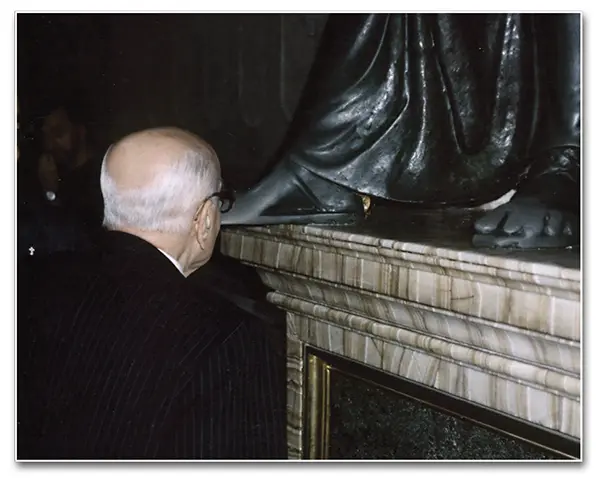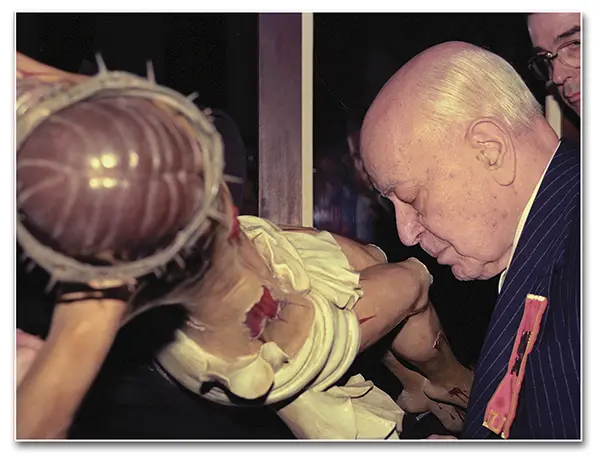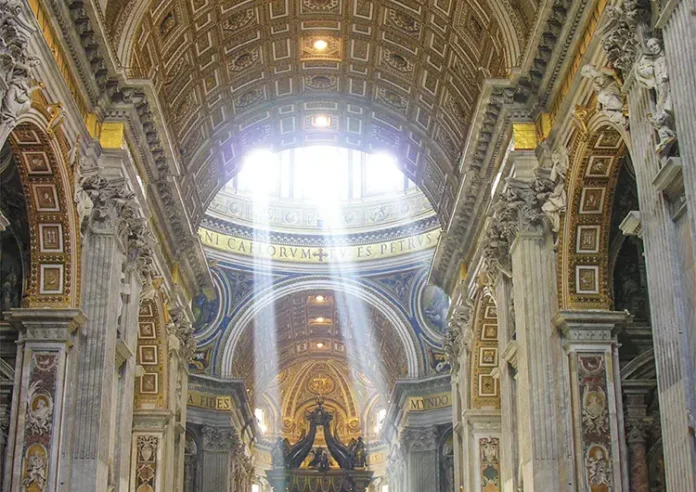More, much more and always more, breaking all limits, surpassing with such exuberance the “normality” of the facts, that his surrender, his restitution and his love were fully on a par with the love of Holy Mother Church for her children… This is the meaning of Plinio Corrêa de Oliveira’s entire existence.
Dr. Plinio always believed he would one day behold the victory of the Holy Church over the gates of hell that try in vain to defeat her
There are those who would like to sum up his epopee in terms of the heroic political battles he sustained, the fame and victories he won, the institutions he founded, the crowds he drew to his ideals, or the persecutions he suffered, the hardships, the disasters, the suffering… But for himself, Dr. Plinio longed for only one title of honour: that of being a man who was wholly Catholic, apostolic and entirely Roman.
If he fought, sacrificing personal advantages to make his life a continuous oblation for the interests of the Papacy and Christendom, it was because he believed with every fibre of his heart that one day he would behold the victory of the Holy Church against the gates of hell (cf. Mt 16:18), which since the night of time have been trying in vain to defeat her.

A faithful son, the fruit of a most faithful mother
Man’s life on earth is a constant struggle (cf. Jb 7:1), but Dr. Plinio’s battle began even before he was born, and it was to his mother that he owed his first victory. If she had listened to the advice of the doctor who suggested she criminally terminate a high-risk pregnancy, her son would never have been born. Thus, through her willingness to offer up her life if necessary, Dona Lucilia taught little Plinio a lesson that would guide his entire life: it will never be enough to obey God and the Holy Church; to be faithful, one must love them to the point of holocaust.
This would not be her only teaching to her son. Gifted with a profound discernment of spirits and a keen psychological sense, he recounted having come to know the true Faith by looking at and analysing Dona Lucilia, comparing the virtues of her soul to the sacral ambiences of the churches he attended, discovering reflections of God Himself in his mother and understanding that from Him came the gentleness, kindness, tenderness and uprightness he perceived in her personality. “I realized that everything that was best in Mama was not hers, but was communicated by the Sacred Heart of Jesus,”1 he commented.
It was by watching her pray, following her way of acting and receiving her beneficial upbringing that Dr. Plinio, already in his early childhood, became enamoured this sacred institution called the Catholic Church and adhered to it with all his being.
From a little polemicist to a great fighter
This adhesion was given all with all his characteristic vehemence. “If the Church is the source from which such marvellous things spring, then: unconditional fidelity to her! Loyalty taken as far as it can go, with no conditions, no limits. It is the Church or nothing!”2 he would exclaim as a young boy.
Obedience to the Holy Church became the light of his life, allowing him to reach the summit of love for her as he learned her truths and doctrines
Obedience to the Holy Church became the light of his life, allowing him to climb, from enthusiasm to enthusiasm, to the summit of an inexpressible love for her as he learned more of her truths and the mysteries of her doctrine. But loving her unreservedly also meant defending her! And it was driven by this threefold desire to love, serve and defend that we see little Plinio – at just four years old! – arguing in a puppet theatre in Paris with an anticlerical character who had a leading role in the play, giving moral lessons to relatives who had strayed from the path of virtue, or catechizing the household servants from atop a chair in the kitchen…
Supported in this by profound mystical graces that helped him glimpse the grandeur of the Holy Church in her essence, Plinio aspired to be as united to her as a “blank piece of paper” in her hands, waiting for whatever she wished to write on it. His obedience reached unimaginable heights. “Our Lady made me discover the truth by exaggerating my obedience to the Church,”3 he would declare decades later, summarizing his life as follows: “I intend to be nothing more than an echo of the great bell that is the Holy Roman Catholic Church, […] the echo that in the midst of battle prolongs the voice of the bell and makes it heard everywhere.”4
For him, the Church was an open gallery through which Heaven could be seen; the joy of all the elect, the glory of the good, the honour of God’s followers; his great enthusiasm and consolation; a Milky Way of perfection, holiness and immutability; the refuge of his soul and his Paradise on earth; in short, the philosopher’s stone of his life, towards which all his admirations converged.5

After the struggles of his student years, Plinio realized that his loyalty had to become militant. If he had to be chaste in order to follow the luminous paths of the Holy Church, he had to be eminently and combatively so! If in order to love her with all his heart it was necessary to renounce the world, he would lock the doors of success with vigour, turning his back on the glories of the world and consecrating his future absolutely to the defence of the Church.
“It is no longer I who live…”
A step of such magnitude was matched by graces of an immeasurable calibre. Captivated by the Holy Church, which he saw as a person capable of feeling, rejoicing and suffering, Dr. Plinio was given a unique gift: a mystical marriage with the one he so loved. This can be inferred from his words: “I gave my soul to the Catholic Church. I did this consciously, thoughtfully, calmly; I did it in such a way that when I decided to do it… it was done! In such a way, the Church had become part of my being.”6
His admiration for the Papacy was boundless, for he understood that this love also encompassed love for Our Lord, Our Lady, and the Church
So, without any fear, he would exclaim, paraphrasing the Apostle (cf. Gal 2:20): “It is no longer I who live, but it is the Holy Roman Catholic Church that lives in me!”7
If during his childhood and youth he loved the Church, in maturity he became one with her; if before he analysed her with rapture, now he saw everything from her eyes; if before he fought from outside to glorify her, much more now, within her, he would lead from the ranks of the laity greater struggles to keep her faithful to herself.

Faced with such a panorama, one can imagine Dr. Plinio’s delight when he considered – in a collapsing world– the promise of infallibility that hovered over the Chair of Peter. A soul made to admire, he venerated the spiritual greatness of the man who, being human, touched the borders of the divine and could safely lead the Holy Church of Jesus Christ through the stormy seas of history. His love for the Roman Pontiff was boundless, because he realized that this love also included love for Our Lord, Our Lady and the Church. “My last thought is of love for the Pope,” he would write on his Catholic identity card.
Nevertheless… how hard the battles that awaited him would be! Accustomed to the atheist and relativist environment of our times, it is hard for us to measure the magnitude of the sacrifice and suffering that Dr. Plinio endured as he faced the revolutionary tide that was sweeping away the last glimmers of Christian civilization from society, as well as striking the millenary foundations of the visible face of the Mystical Bride of Christ. “The great suffering of my life was the crisis of the Church,”8 he would declare at the end of his days.
More than generosity, heroism
Faced with such a panorama, Dr. Plinio understood, by a special action of grace, that to defend the Holy Church it was not enough to write works, deliver speeches or organize campaigns in the streets… She needed not only the generosity of one who fights or polemicizes, but the heroism of one who consumes himself like a candle, aware that he has offered himself as a sacrifice.
Knowing that the treasure of the Church lies in all the suffering souls and that – to paraphrase the beautiful expression of St. Bernard – “there is only one way to love the Church: to love her without measure,”9 he took the sorrows of this Holy Mother upon himself as if they were his own.
The Church needed not only the generosity of those who fought and polemicized, but the heroism of those who offered themselves as a holocaust
Measuring and weighing the enormity of the sufferings that would come, and accepting with love the torment of his days, without, however, knowing for certain what use this blood would be, Dr. Plinio assumed a posture of incomparable fidelity: “If I suffer, being hated, persecuted and despised because I have been faithful to the immutable and eternal aspects of the Holy Catholic Church, so be it! My martyrdom of soul or my martyrdom of body will be a continuation of the suffering of Our Lord Jesus Christ. Oh, glory! Asking His Blessed Mother to give me courage, I will go forward under the contempt and hatred of the whole world.”10

How did he consummate this offering and how did he live it? That is what we will see in the next article. Here we will do well to ask, with him, for the grace to embrace the same path: “May I also, Lord, in the great desolations of the Church, be always faithful; may I be present in the saddest hours, unshakably preserving the certainty that the Church will triumph by the fidelity of the good because Thy protection assists her!”11 ◊
Notes
1 CORRÊA DE OLIVEIRA, Plinio. Conversation. São Paulo, 4/1/1995.
2 CORRÊA DE OLIVEIRA, Plinio. Conversation. São Paulo, 9/10/1985.
3 CORRÊA DE OLIVEIRA, Plinio. Conversation. São Paulo, 24/6/1982.
4 CORRÊA DE OLIVEIRA, Plinio. Conference. São Paulo, 15/1/1970.
5 Expressions of Dr. Plinio taken from: Conversation. São Paulo, 11/10/1983; Conference. São Paulo, 26/9/1992 and 26/11/1993.
6 CORRÊA DE OLIVEIRA, Plinio. Conversation. São Paulo, 5/8/1988.
7 CORRÊA DE OLIVEIRA, Plinio. Conference. São Paulo, 7/6/1978.
8 CORRÊA DE OLIVEIRA, Plinio. Conversation. São Paulo, 19/6/1995.
9 CORRÊA DE OLIVEIRA, Plinio. Conference. São Paulo, 6/10/1989.
10 CORRÊA DE OLIVEIRA, Plinio. Conference. São Paulo, 30/3/1985.
11 CORRÊA DE OLIVEIRA, Plinio. Via-Sacra. In: Catolicismo. Campos dos Goytacazes. Year I. No.3 (Mar., 1951), p.5.


